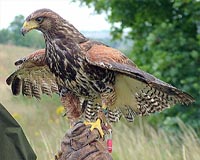 |
Watkinsville GA (SPX) Mar 08, 2011 A team of U.S. Department of Agriculture (USDA) scientists has given growers in the Piedmont guidance on how to restore degraded soils and make the land productive. Researchers with the USDA's Agricultural Research Service (ARS) found that if cattle are managed so that they graze moderately, soil quality can be restored and emissions of carbon dioxide (a greenhouse gas) can be reduced. ARS is USDA's principal intramural scientific research agency. The research, published in the Soil Science Society of America Journal, supports the USDA priority of responding to climate change. Cotton, soybean, sorghum and wheat are widely grown in the Piedmont, an area which stretches from Alabama to Virginia. But decades of plowing have degraded the soil and growers have slowly allowed much of the land to revert to forests and pastures, according to Alan Franzluebbers, an ecologist at the ARS J. Phil Campbell Sr. Natural Resource Conservation Center in Watkinsville, Ga. Franzluebbers led a project where grasses were planted on rolling, eroded land in northeastern Georgia and pastures were grazed by beef cattle to assess grazing effects on soil quality. Coastal bermudagrass was planted initially. After five years, tall fescue was drilled into the bermudagrass to extend the grazing season from five months to 10 months of the year. The research team included retired ARS scientists John Stuedemann and Stan Wilkinson. The researchers varied the number of cattle per acre and assessed how the soils responded to different grazing scenarios. Under each scenario, they looked at the amount of soil compaction that occurred, the amounts of organic carbon and nitrogen in the soil, and the amounts of surface plant residues, which help prevent erosion. They also looked at how the soil responded to three different fertilizer treatments (inorganic, mixed inorganic and organic broiler litter, and organic broiler litter). From an environmental standpoint, grasslands have traditionally been viewed as best managed by leaving the land unused. But the team found that while fertilizer type made little difference, different grazing scenarios produced different effects, and the grazed land produced more grass than the ungrazed land and had the greatest amount of carbon and nitrogen sequestered in soil. Sequestering carbon and nitrogen in soil has become a major goal for agriculture, because that sequestration reduces greenhouse gas emissions.
Share This Article With Planet Earth
Related Links USDA's Agricultural Research Service (ARS) Farming Today - Suppliers and Technology
 Humans Give Prey The Edge In Food Web
Humans Give Prey The Edge In Food WebCalgary, Canada (SPX) Mar 08, 2011 A new paper by University of Calgary researchers, published in PLoS ONE, demonstrates the edge given to prey in the "space race" by human activity. The research was conducted by two University of Calgary students, a University of Calgary Post-Doctoral Fellow and two University of Calgary professors from the Faculty of Environmental Design, Department of Geomatics in the Schulich School of ... read more |
|
| The content herein, unless otherwise known to be public domain, are Copyright 1995-2010 - SpaceDaily. AFP and UPI Wire Stories are copyright Agence France-Presse and United Press International. ESA Portal Reports are copyright European Space Agency. All NASA sourced material is public domain. Additional copyrights may apply in whole or part to other bona fide parties. Advertising does not imply endorsement,agreement or approval of any opinions, statements or information provided by SpaceDaily on any Web page published or hosted by SpaceDaily. Privacy Statement |